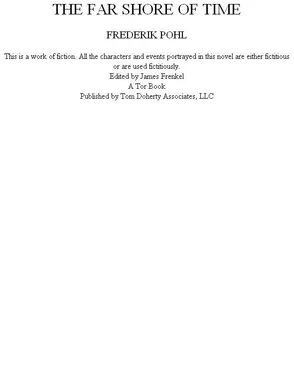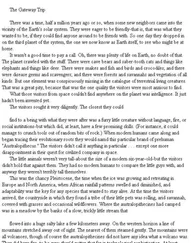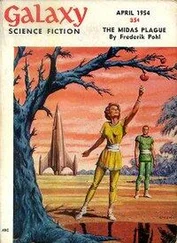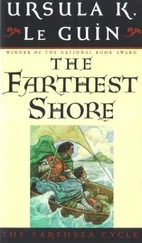Pohl, Frederik - The Far Shore of Time
Здесь есть возможность читать онлайн «Pohl, Frederik - The Far Shore of Time» весь текст электронной книги совершенно бесплатно (целиком полную версию без сокращений). В некоторых случаях можно слушать аудио, скачать через торрент в формате fb2 и присутствует краткое содержание. Жанр: Старинная литература, на английском языке. Описание произведения, (предисловие) а так же отзывы посетителей доступны на портале библиотеки ЛибКат.
- Название:The Far Shore of Time
- Автор:
- Жанр:
- Год:неизвестен
- ISBN:нет данных
- Рейтинг книги:3 / 5. Голосов: 1
-
Избранное:Добавить в избранное
- Отзывы:
-
Ваша оценка:
- 60
- 1
- 2
- 3
- 4
- 5
The Far Shore of Time: краткое содержание, описание и аннотация
Предлагаем к чтению аннотацию, описание, краткое содержание или предисловие (зависит от того, что написал сам автор книги «The Far Shore of Time»). Если вы не нашли необходимую информацию о книге — напишите в комментариях, мы постараемся отыскать её.
The Far Shore of Time — читать онлайн бесплатно полную книгу (весь текст) целиком
Ниже представлен текст книги, разбитый по страницам. Система сохранения места последней прочитанной страницы, позволяет с удобством читать онлайн бесплатно книгу «The Far Shore of Time», без необходимости каждый раз заново искать на чём Вы остановились. Поставьте закладку, и сможете в любой момент перейти на страницу, на которой закончили чтение.
Интервал:
Закладка:
She gave me a Hilda Morrisey stare. “Are you giving me orders, Danno?”
“I’m telling you that we can’t afford to. He can help us figure out just what the Scarecrows are up to. And,” I added, “we’ll need that robot of his; it has a lot of information Beert doesn’t. So get it flown in from Arlington right away, will you?”
She made a face. “Christ. Marcus will have a fit. All right. I’ll give that order, and then I’ll tell Marcus about it.”
I didn’t want to let it go at that, so I insisted. “And you’ll tell him not to get any ideas about stalling the Scarecrows by wasting Beert in front of the cameras.”
She gave me an opaque look. “Not right away, anyway. Now get the hell out of here so they can take all this crap off me.”
Then it got crazy.
While Hilda was getting a team together I took a quick run to the sub. There was only one Doc on listening duty, and it was Foozh. He was jabbering at the duty guard as I came through the hatch, and mewed and whined at me twice as fast as soon as he saw me. Of course I couldn’t understand a word, but I could hear the meows and growls that were coming from the speaker. Lots of them. They were busy out there, and when Pirraghiz and Mrranthoghrow got there she began translating at once.
The subs were doing something, all right. They weren’t traveling very far; they were pausing at discrete points along the various continental shelves, then moving no more than a kilometer or two and pausing again. Pirraghiz said it sounded like they were depositing things on the sea bottom. What things? She had no idea; the orders from the scout ship never said. For what purpose? She didn’t know that, either.
But I had no doubt that it was bad news.
An hour later we had a kind of a task force gathered-me and Been and his Christmas tree, plus eight or nine Bureau specialists. Hilda was there, back in her box, and so was the deputy director; he had taken time out from his witch hunt to bring the robot in person-and also to let me know that this was all my fault, because if I had let him hide Beert away in Arlington, the way he wanted to, nobody would have known he was there.
He was wrong about that, of course-whoever leaked the story would have known about the sub, anyway, with or without Beert. I didn’t argue. I spoke to Beert, ignoring everybody else. “Something the Greatmother said has been nagging at me, something about the Others killing off rebellious races by poison gas. Do you remember what it was?”
“Of course, Dan,” he said promptly. “It is part of our history. What do you wish to know?”
“What kind of gas? How do they get it to the planet?”
He waggled his neck at me. “It isn’t necessary to do that, Dan. On most planets like your own, such poisons are already there in the oceans. They need only to be released.”
And when I translated all that, the yelling began. There was no poison gas in the oceans, the experts insisted. There certainly was, Beert said stoutly, because the Greatmother of the Greatmother had said so. All right, snapped the experts, what poison are you talking about?
Naturally, Beert’s words meant nothing when he answered. Nor did the robot’s, when asked, but the robot had a better way of communicating. It drew pictures for us. A big dot with a little dot near it. A cluster of a dozen big dots, some filled in, some just circles, with six little dots near it.
It was the Bureau’s chemical-warfare specialist who figured it out: “They’re diagrams of elements! Hydrogen and carbon!” And when the robot said there were four of the second diagram for every one of the first in this poison, the chemist blinked and smote her forehead with her hand and said, “Of course!” It was the first time I had heard the word “methane.”
PART ELEVEN
Methane
CHAPTER FIFTY-THREE
All right, I admit it. I should have thought of it before. Call it fatigue, call it too much going on-no, just call it that I screwed up. That’s certainly what Hilda told me. It was what the deputy director told me, too, but he didn’t waste any time. Two hours later he and Hilda and I, pumped up with the Bureau’s wake-up pills, were watching the sun rise on the landing pad, where an oceanologist was tumbling off a VTOL from New Jersey. His name was Samuel Schiel, and he came from the Lamont-Doherty Institute-well, actually he came from his bed, because the deputy director’s summons had come in the middle of the night-and he barely had time to catch his breath before Marcus Pell had whisked him into a conference room and the questioning had begun.
Pell didn’t even sit down. He stood behind the big chair at the head of the table and turned on the man. “You, what’s your name, Schiel? Is this methane thing possible?”
Schiel was unfazed. He took a seat halfway down the long table, next to me, across from Hilda, looking around the room with interest. “Possible?” he repeated ruminatively. “Yes, in principle, Mr. Pell. Methane is a very common compound. It’s the first member of the alkane hydrocarbons, a very simple molecule, and there’s a great deal of it around in the form of clathrates, at least ten to the fifteenth cubic meters-Pardon? Oh.” He moved his lips for a moment, doing arithmetic. “At least ten thousand million million cubic meters of the stuff, that is. Probably more. Much of it’s locked up in permafrost in Asia and North America, but there’s a tremendous amount on the sea bottoms. If you’d care to look-I asked my staff to transmit a map of the main deposits to me on the plane-“
He did something to the control for the screens at each place. While we were looking at them he investigated the coffee jug at his place, found it was full, poured himself a cup and waited for us to see what he was talking about.
I swallowed when I saw where the main deposits were: some of the biggest along the Atlantic Coast of the Americas, along the Pacific shore of Panama, the Bering Strait-I knew those areas well. “That’s exactly where the subs are concentrating,” I said.
Pell gave me a shut-up look; he had obviously figured that out for himself. “How come you know all this?” he demanded, looking at Schiel.
Schiel put down his coffee cup. “Why, the methane beds have been investigated quite thoroughly; there was some hope of tapping them as a replacement for petroleum resources. Methane is a very good, clean-burning fuel, but some of the best deposits are a kilometer deep or more, and they’re not easy to exploit. Perhaps I should explain their physical nature?”
Pell sighed, reconciling himself to being lectured at by an expert but seeing no way out of it. “Perhaps you goddam should,” he grumbled.
Schiel nodded briskly and went on. “The methane content of the clathrates is hydrated,” he said. “That means that each methane molecule is surrounded by a sort of cage of water molecules, in the form of ice under pressure. If the temperature rises or the pressure decreases, the clathrate disintegrates. When samples are trawled up from the sea bottom they begin to bubble and sizzle and fall apart even before they reach the surface, often quite explosively. Worse, there is some evidence that any attempt to exploit these resources for fuel may be quite dangerous. You see, under the clathrate beds there are trapped bodies of gaseous methane. When the crust is broken through, the methane gas can escape. In great volume, Mr. Pell. In which case it appears capable of turning the ocean itself into a sort of froth which is no longer dense enough to float a vessel. A Soviet drilling ship which was mysteriously lost many years ago is thought to have sunk when that happened, and there have been conjectures that such events, off the coast of the Carolinas, may have been responsible for some of the alleged disappearances in the so-called Bermuda Triangle.” He looked around the room. “Is that what you wanted to know, Mr. Pell?”
Читать дальшеИнтервал:
Закладка:
Похожие книги на «The Far Shore of Time»
Представляем Вашему вниманию похожие книги на «The Far Shore of Time» списком для выбора. Мы отобрали схожую по названию и смыслу литературу в надежде предоставить читателям больше вариантов отыскать новые, интересные, ещё непрочитанные произведения.
Обсуждение, отзывы о книге «The Far Shore of Time» и просто собственные мнения читателей. Оставьте ваши комментарии, напишите, что Вы думаете о произведении, его смысле или главных героях. Укажите что конкретно понравилось, а что нет, и почему Вы так считаете.












